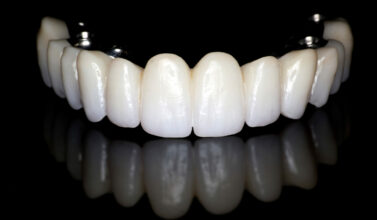Understanding Dental Implants Procedures: Your Step-by-Step Guide
This comprehensive guide is dedicated to providing patients with an understanding of the dental implant procedure, a revolutionary advancement in dental care offering a long-term solution for a replacement tooth or damaged natural teeth. The dental implant process has become increasingly popular and more common due to its ability to restore both function and aesthetics, significantly improving the quality of life for patients worldwide.
The Dental Implant Process
Dental implants are a comprehensive solution for replacing damaged or missing natural teeth, involving a multi-step procedure spanning several months. The treatment journey is typically as follows:
Initial Consultation
This first step involves thoroughly examining your teeth, gums, and jawbone. Your dentist or dental specialist will use X-rays and 3D imaging to assess the condition of your jawbone and take digital impressions of your teeth. This evaluation is crucial to determine the best action for the dental implant procedure. These will be discussed if you have any medical conditions or are taking medications to ensure safe and effective treatment.
Creation of a Treatment Plan
Once your Aria dentist has all the relevant information, as part of your initial consultation, they will explain to you your different dental implant treatment options. Typically, there will be a number of options to allow you to make the final decision based on your desired treatment outcome, budget and personal preferences. Once you have accepted your treatment plan, your Aria Dental treatment coordinator will guide and care for you throughout your dental implant procedures.
Tooth Extraction (if necessary)
If there is a damaged or decayed tooth at the implant site (or sites), it needs to be removed. The complexity of this extraction depends on the condition of the tooth. Anesthesia options are available and will be discussed to ensure a painless stress-free procedure.
Bone Grafting (if required)
In cases where the jawbone isn’t thick enough or is too soft to support the dental implant, a bone graft may be necessary to provide a solid base for the implant. This can involve using natural bone from another location in your jaw or synthetic bone graft materials. The healing process for a bone graft can vary, generally taking 2-3 months. Your dental specialist may opt to use Zygomatic implants, a very long dental implant that can be used in the upper jaw, which removes the need for bone grafting in this area.
Dental Implant Placement
The actual placement of the dental implant involves making an incision in the gum tissue to expose the bone, followed by drilling holes into the bone where the implant will be placed. The dental implants serve as a new root for the tooth. A healing cap or temporary denture might be placed over the top for protection and aesthetic purposes during the healing process.
Osseointegration
This is the process where the jawbone grows into and bonds with the surface of the dental implant, a phase that can take several months. This is a crucial step for providing a solid base for the new artificial tooth. If it fails to integrate &/or heal properly, then the dental implant fixture will become loose and potentially fall out (fail).
Abutment Placement
Once osseointegration is complete, an abutment is placed. The abutment is the part to which the crown will eventually attach. This is done in a minor surgical procedure under local anesthesia or sleep dentistry.
Placing the Permanent Crown or Full Arch Bridge
After your gums heal around the abutment, we take new digital impressions of your mouth and the remaining teeth to create your final new prosthesis. The crown or bridge is the visible part of the tooth, which can be either screwed or cemented onto the abutment.
The primary difference between a dental crown and a full arch bridge lies in their scope and function. A crown is designed to replace a single tooth that is missing, damaged, or decayed. It is attached to the screw via the abutment and acts as a top cap, restoring the tooth’s shape, strength, and appearance.
A full arch bridge is a more extensive restoration used to replace all the teeth in either the upper or lower jaw. It spans the entire top or bottom of the jaw arch and is typically supported by 5 dental implants. This solution is used in cases of significant tooth loss or when an entire arch of teeth needs replacement, providing a comprehensive solution for restoring function and appearance.
How Long does a Dental Implant Procedure take?
Throughout this entire process, factors such as your general health, medical history, personal habits, the condition of your jawbone, and whether additional procedures like bone grafting or tooth extractions are necessary will influence the overall timeline, cost, and dentist’s approach.
Recovery and aftercare after receiving your dental implants procedure are also critical aspects of the process. Following the instructions is essential to ensure proper healing and avoid any complications. This may include short-term dietary restrictions, oral hygiene practices, and medications to help manage pain or prevent infection. Looking after the natural teeth you keep is also very important.
Which Dental Implant Procedure is right for me?
There are different teeth replacement treatments are available, each designed to cater to different needs and preferences. These treatments can be broadly categorised into fixed dental implant options and removable tooth replacement options.
Fixed Dental Implant Options
- Single Dental Implants: Ideal for replacing individual missing teeth. These involve inserting a titanium post into the jawbone, the implant placement, which serves as a root for the crown. Each implant replaces one tooth, making this option suitable for those with healthy teeth and gums.
- All Teeth Replacements (Full Arch Replacements): This option is for those needing the replacement of all teeth in either the upper or lower jaw or both. It involves multiple implants that support a full arch of prosthetic teeth. This is more stable and natural-looking than traditional full dentures.
Removable Options
- Overdentures: These are a type of denture that is anchored by dental implants but can be removed for cleaning. Overdentures snap onto the implants, providing more stability than traditional dentures, but are not as permanent as fixed options.
- Traditional Dentures: The most traditional form of removable artificial teeth and do not use dental implants. These dentures rest on the gums and can replace a few missing teeth (partial dentures) or a full set of teeth (complete dentures). They are less expensive than dental implants but do not offer the same level of comfort or functionality.
Each of these options has its advantages and limitations. Fixed dental implant options for jawbone, such as single implants or an All on 4, offer a more permanent and natural-feeling solution. They also help preserve jawbone health and provide better functionality in chewing and speaking. However, they require a sufficiently healthy jawbone for implantation, time, and can be more expensive.
On the other hand, removable options for artificial teeth, like overdentures and traditional dentures, are generally more affordable and seen as less invasive. They can be easier to adapt to and are a viable option for those not candidates for dental implants due to medical reasons or insufficient bone density. However, they may require more maintenance and can be less comfortable and stable than fixed implant solutions.
In choosing the right dental implant procedure, it’s essential to consider factors like oral health, the number of teeth to be replaced, lifestyle, budget, and your personal preference. Consulting with a dental professional is a crucial step to determine the most suitable dental implant procedure option based on your individual missing tooth needs and circumstances.
Dental Implant Surgery
When considering who should perform your dental implant surgery, choosing the right professional is important based on their expertise, experience, and specialisation. You may see several dental providers specialising in different areas based on your circumstances. The options generally include general dentists, prosthodontists, oral surgeons, periodontists, and sometimes cosmetic dentists.
General Dentists
Many general dentists are qualified to perform dental implant surgery, and they might do so, especially in more straightforward cases. However, some may lack the experience, skill, and specialised equipment and may prefer to focus on general dentistry, referring more complex cases to specialists.
Prosthodontists
Prosthodontists are dental specialists focused on restoring and replacing missing or damaged teeth and treating issues related to jaw structures and maxillofacial tissues. This specialty is unique within dentistry for its concentration on physical, cosmetic or aesthetic restoration and teeth replacement. Prosthodontists are extensively trained in dental restoration procedures and work with dental prosthetics.
Maxillofacial Surgeons
Oral surgeons are highly specialised in surgical treatments of the jaw, mouth, and facial structures. They have extensive training, including a residency program, making them particularly adept at more complex dental implant surgeries, especially those requiring additional jaw bone grafting procedures.
Periodontists
These specialists focus on gum health and supporting teeth structures. While they can perform surgeries, their specialty is not primarily on implants. They will support the implant treatment process, treating issues before the patients undergo surgery. They are often involved in cases where gum health is a significant concern or if there are complications related to gum disease before the implant process.
When choosing the right professional for your dental implant surgery, consider the complexity of your case, the health of other teeth, your gums and jawbone, and the level of expertise required. Oral surgeons are often the most experienced in surgical procedures, making them a good choice for more complex cases or when additional procedures like bone grafting are necessary. However, for straightforward cases, a general dentist might be sufficient. It’s important to discuss your specific needs and concerns with your dentist, who can then recommend the most suitable professional for your situation.
Dental Laboratory
The dental laboratory plays a crucial role, particularly in the creation of the crown or full arch bridge. Dental technicians work on colour-matching and designing the prosthesis to ensure that it looks natural and matches your existing teeth in colour and shape. This meticulous process ensures the final implant is both functional and aesthetically pleasing.
What are the Do’s and Do Not’s after Dental Implants?
After getting a dental implant procedure, it’s important to follow specific care instructions provided by your Aria Dental treatment coordinator to ensure proper healing and implant success.
Do’s:
- Maintain good oral hygiene: Brush and floss your implants & your own teeth regularly.
- Follow your dentist’s instructions for aftercare. Watch our Aria care video.
- Eat softer foods initially to avoid pressure on the implant area.
- Keep your follow-up appointments with your dentist.
Don’ts:
- Avoid smoking or vaping, as it can impede healing.
- Steer clear of very hard, chewy, or sticky foods in the initial healing phase.
- Avoid disturbing the implant site with your tongue or fingers or other items like toothpicks etc.
- Refrain from rigorous physical activity immediately after the procedure.
Always consult with your Aria dental professional for personalised advice and follow-up care.
Considering Dental Implants? Aria can help.
At Aria Dental, we offer patients a complimentary consultation for dental implants, which includes your appointment, an examination, and any diagnostics or x-rays required (such as bitewing, OPG, CBCT/ 3D Bone Scan) by your Aria dental provider to complete your detailed dental implant treatment plan. This no-out-of-pocket Aria dental implant service can cost up to $750.00 at other clinics.
Aria Dental has clinics in Perth CBD, Maddington, Midland, North Perth, Scarborough, and Warwick. With Aria Dental, your search for local dental implant services near you is easy. Call our centralised Patient Services team on 08 9226 2135, and then we can book you into initial consultation at your most convenient location.
Contact Us









